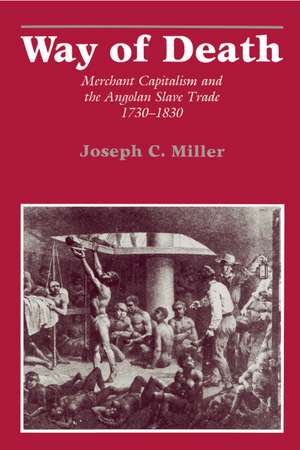Way of Death: Merchant Capitalism and the Angolan Slave Trade, 1730–1830
Autor Joseph Calder Milleren Limba Engleză Paperback – 15 oct 1996
This acclaimed history of Portuguese and Brazilian slaving in the southern Atlantic is now available in paperback.
With extraordinary skill, Joseph C. Miller explores the complex relationships among the separate economies of Africa, Europe, and the South Atlantic that collectively supported the slave trade. He places the grim history of the trade itself within the context of the rise of merchant capitalism in the eighteenth century. Throughout, Miller illuminates the experiences of the slaves themselves, reconstructing what can be known of their sufferings at the hands of their buyers and sellers.
With extraordinary skill, Joseph C. Miller explores the complex relationships among the separate economies of Africa, Europe, and the South Atlantic that collectively supported the slave trade. He places the grim history of the trade itself within the context of the rise of merchant capitalism in the eighteenth century. Throughout, Miller illuminates the experiences of the slaves themselves, reconstructing what can be known of their sufferings at the hands of their buyers and sellers.
Preț: 312.96 lei
Nou
Puncte Express: 469
Preț estimativ în valută:
59.89€ • 62.68$ • 49.84£
59.89€ • 62.68$ • 49.84£
Carte tipărită la comandă
Livrare economică 01-15 aprilie
Preluare comenzi: 021 569.72.76
Specificații
ISBN-13: 9780299115647
ISBN-10: 029911564X
Pagini: 796
Ilustrații: 15 maps, 12 figures & tables
Dimensiuni: 152 x 229 x 48 mm
Greutate: 1.08 kg
Ediția:1
Editura: University of Wisconsin Press
Colecția University of Wisconsin Press
ISBN-10: 029911564X
Pagini: 796
Ilustrații: 15 maps, 12 figures & tables
Dimensiuni: 152 x 229 x 48 mm
Greutate: 1.08 kg
Ediția:1
Editura: University of Wisconsin Press
Colecția University of Wisconsin Press
Recenzii
“A landmark study in the history of the Atlantic slave trade. It will be an essential reference for anyone who writes on the trade, from whatever perspective, for years to come. . . . This book is full of rich data, especially concerning the passage from the interior to the coast, the role of Luso-Africans and Europeans in Angolan port cities, and conditions on the ‘floating tombs’ that carried their deathly cargoes across the Atlantic.”—Phyllis M. Martin, African Economic History
“Way of Death . . . [opens] up in profuse detail and at considerable length the history of the Portuguese South Atlantic empire. . . . We meet African traders dependent on credit extended by Portuguese merchants supplying slaves to Brazilian shippers who were trying to become merchants on their own. And in the background is the shadowy . . . presence of English capital.”—Stuart B. Schwartz, New York Times Book Review
“Other scholars have attempted studies of this type, but no one approaches Miller in depth.”—John K. Thornton, International Journal of African Historical Studies
Notă biografică
Joseph C. Miller is T. Cary Johnson, Jr., Professor of History at the University of Virginia. His books include Kings and Kinsmen, Slavery and Slaving in World History, and The African Past Speaks.
Descriere
This acclaimed history of Portuguese and Brazilian slaving in the southern Atlantic is now available in paperback.
With extraordinary skill, Joseph C. Miller explores the complex relationships among the separate economies of Africa, Europe, and the South Atlantic that collectively supported the slave trade. He places the grim history of the trade itself within the context of the rise of merchant capitalism in the eighteenth century. Throughout, Miller illuminates the experiences of the slaves themselves, reconstructing what can be known of their sufferings at the hands of their buyers and sellers.
With extraordinary skill, Joseph C. Miller explores the complex relationships among the separate economies of Africa, Europe, and the South Atlantic that collectively supported the slave trade. He places the grim history of the trade itself within the context of the rise of merchant capitalism in the eighteenth century. Throughout, Miller illuminates the experiences of the slaves themselves, reconstructing what can be known of their sufferings at the hands of their buyers and sellers.












